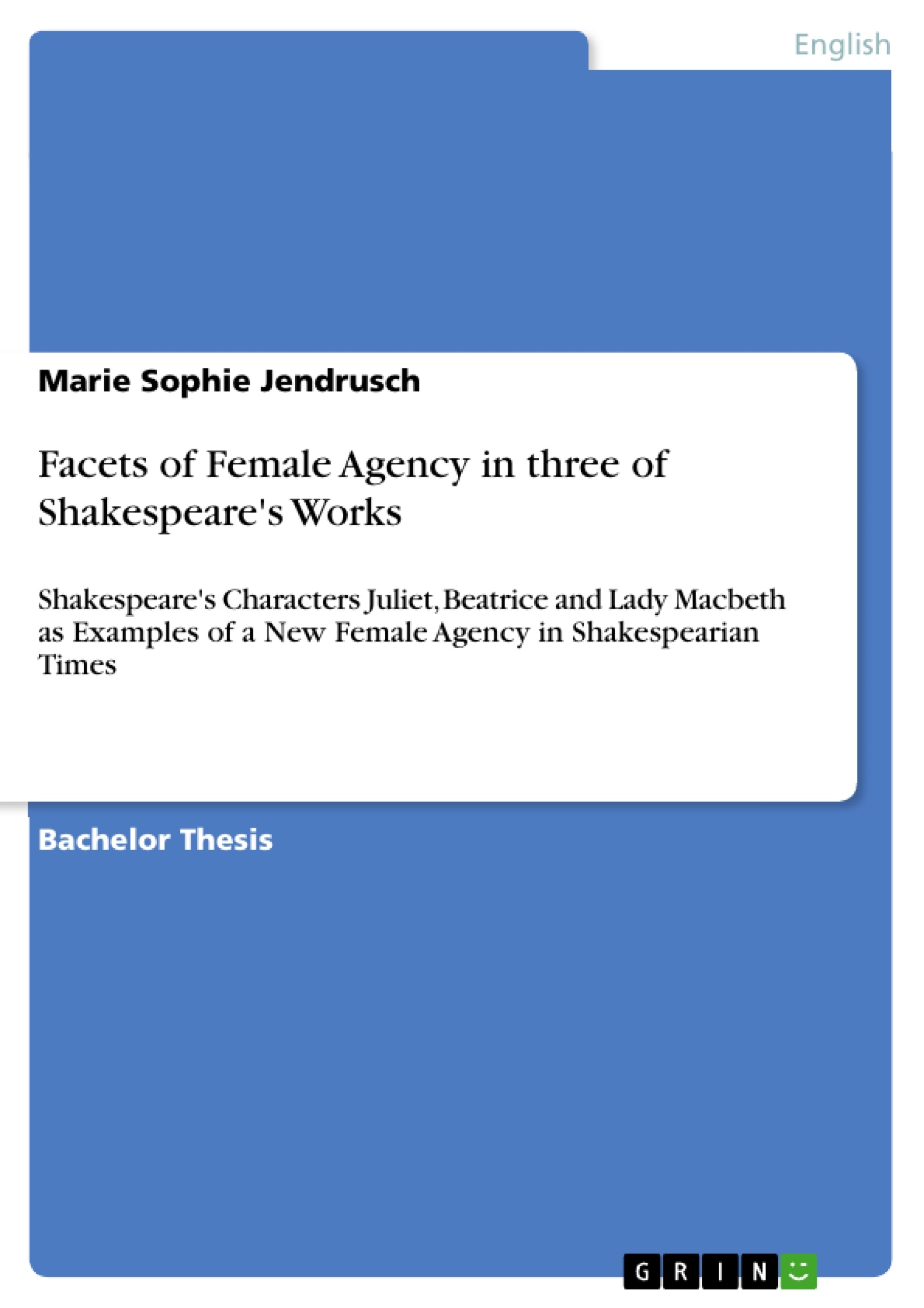In this Bachelor thesis I will analyse Juliet, Beatrice and Lady Macbeth's agency in relation to the plays' plots, the outer and inner processes of the plays and characters, their relationships to men and their own character traits. I will do so against the background of the usual image of women in Shakespearian times.
In order to do so, I will first outline the typical gender roles in Shakespearian times, focusing especially on activity and passivity. This will then be applied to Shakespeare's plays. First, Juliet will be the focus of this paper, followed by Beatrice and after that Lady Macbeth. I will look at their characters development following the chronological order of events in the plays. This will illustrate the development of agency in Shakespeare's plays and also its limits. In the sixth chapter, the similarities between the examined characters will be pointed out to illuminate Shakespeare's approach in more general terms and to make a final judgement about Juliet, Beatrice and Lady Macbeth as non-typical women in the 16th and 17th century.
All in all, the Bachelor thesis in hand aims at answering the following questions: What are the typical gender roles in Shakespearian times with special reference to agency? In how far does Shakespeare establish a new female agency in the exemplary plays Romeo and Juliet, Much Ado About Nothing and Macbeth, and how is this agency represented individually by the characters Juliet, Beatrice and Lady Macbeth?
Inhaltsverzeichnis (Table of Contents)
- Introduction
- Active and Passive Gender Roles in Shakespearian Times
- Romeo and Juliet – Loving Juliet
- Act One - Agency in Mind
- Act Two - Prompting the Plot
- Act Three – Keeping Up Agency Despite All Burdens
- Act Four - Acting Out the Plan
- Act Five-Suicidal Agency
- Much Ado About Nothing - Witty Beatrice
- Act One - Agency in Eloquence
- Act Two - Agency in Refusing to Act
- Act Three - A Changing Course of Action
- Act Four - Demanding Agency
- Act Five Silenced Agency
- Macbeth - Strategic Lady Macbeth
- Act One - Manipulative Agency
- Act Two - Acting Out the Regicide
- Act Three - Fading Agency
- Act Four - The Loss of Agency
- Comparing the Three Women
- Conclusion
Zielsetzung und Themenschwerpunkte (Objectives and Key Themes)
This Bachelor thesis analyzes the agency of Juliet, Beatrice, and Lady Macbeth in Shakespeare's plays, examining their character development, relationships with men, and individual traits against the backdrop of typical gender roles in Elizabethan England. The analysis aims to illustrate the emergence of a new female agency in Shakespeare's works and explore its limitations.
- The portrayal of female agency in Shakespeare's plays.
- The contrast between traditional gender roles and the agency exhibited by Juliet, Beatrice, and Lady Macbeth.
- The evolution of female agency throughout the plays.
- The relationship between female agency and societal expectations.
- The potential limitations of female agency within the context of Shakespeare's era.
Zusammenfassung der Kapitel (Chapter Summaries)
- Introduction: This chapter introduces the concept of female agency in Shakespeare's works, contrasting it with the traditional expectations of women in Elizabethan England. The thesis statement establishes the focus on Juliet, Beatrice, and Lady Macbeth as exemplary characters demonstrating this new agency.
- Active and Passive Gender Roles in Shakespearian Times: This chapter delves into the social and cultural context of Elizabethan England, highlighting the expectations of women and their limited agency in a patriarchal society.
- Romeo and Juliet – Loving Juliet: This chapter examines Juliet's agency throughout the play. The focus is on her active participation in the plot, her pursuit of love, and her defiance of societal expectations.
- Much Ado About Nothing - Witty Beatrice: This chapter examines Beatrice's agency, highlighting her independent nature, wit, and resistance to societal pressures regarding marriage.
- Macbeth - Strategic Lady Macbeth: This chapter examines Lady Macbeth's agency, focusing on her ambition, manipulative nature, and involvement in the murder of King Duncan.
- Comparing the Three Women: This chapter provides a comparative analysis of the three women, emphasizing their similarities and differences in terms of their agency and how they navigate the constraints of their social environment.
Schlüsselwörter (Keywords)
This thesis explores themes of female agency, gender roles, Elizabethan society, Shakespearean drama, love, marriage, ambition, manipulation, and the impact of societal expectations on individual choices.
Frequently Asked Questions
What does "female agency" mean in Shakespeare's works?
Female agency refers to the capacity of female characters to act independently, make choices, and influence the plot of the play.
How were gender roles defined in Shakespearian times?
Typical roles were patriarchal, emphasizing female passivity, obedience, and domesticity, while men were expected to be active and dominant.
In what way does Juliet demonstrate agency?
Juliet shows agency by actively pursuing her love for Romeo, defying her parents' wishes, and taking decisive (though tragic) actions to control her destiny.
What characterizes Beatrice's agency in "Much Ado About Nothing"?
Beatrice's agency is shown through her wit, her independent spirit, and her refusal to conform to traditional expectations regarding marriage.
How does Lady Macbeth's agency evolve in "Macbeth"?
Initially, she shows manipulative and strategic agency to prompt the regicide, but eventually loses her agency as she descends into guilt and madness.
- Citar trabajo
- Master of Education Marie Sophie Jendrusch (Autor), 2017, Facets of Female Agency in three of Shakespeare's Works, Múnich, GRIN Verlag, https://www.grin.com/document/1236049



